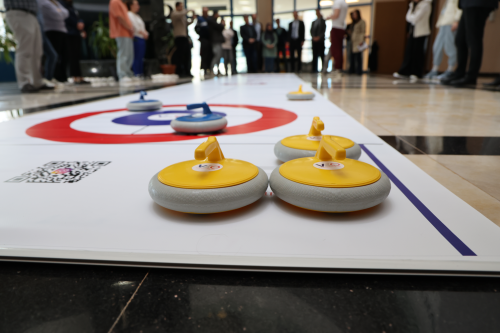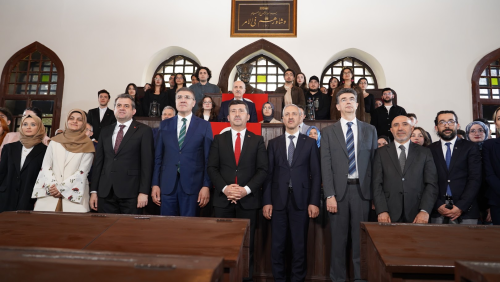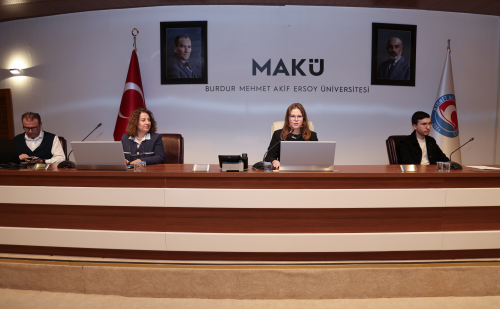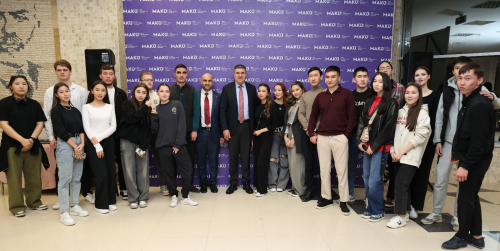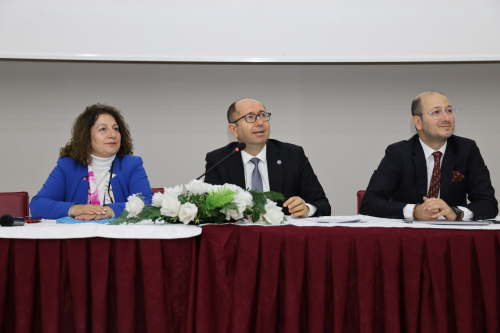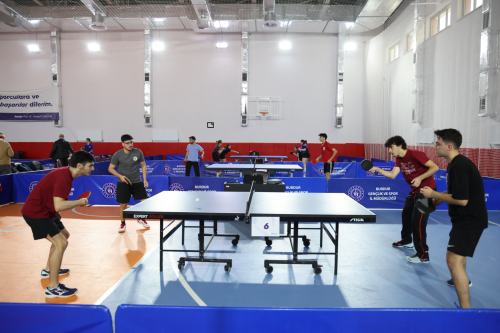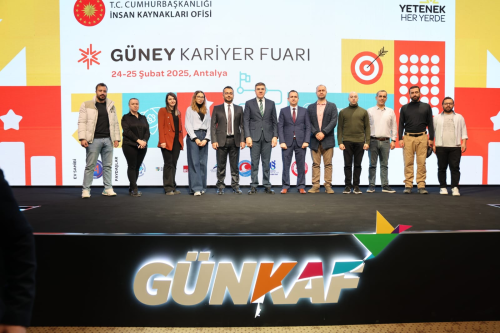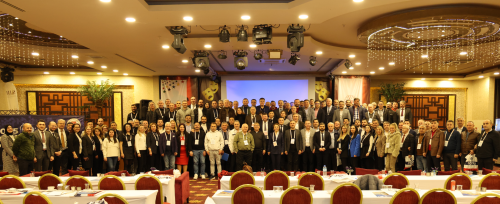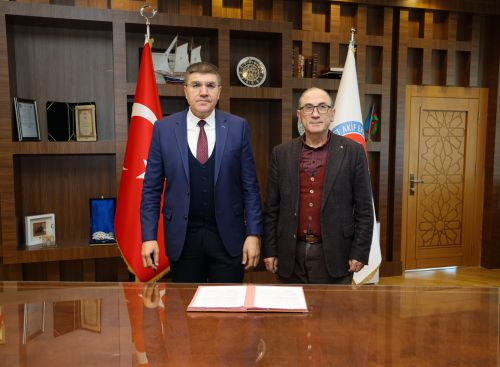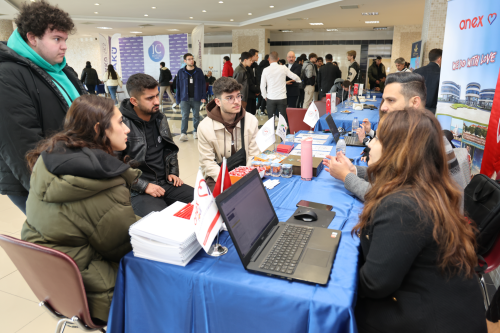Approximately 250 people attended the meeting, including Burdur Governor Tülay Baydar Bilgihan, Burdur Members of Parliament Prof. Dr. Adem Korkmaz and Mustafa Oğuz, Burdur Mayor Ali Orkun Ercengiz, Provincial Special Administration General Secretary, Provincial Directors, cooperative presidents, breeders, sector representatives, and academics.
At the event hosted by MAKÜ Rector Prof. Dr. Hüseyin Dalgar, 14 important projects developed by MAKÜ academics were introduced.
These projects aim to contribute to the sector by offering sustainability, modern production methods, rural development, and environmentally friendly approaches in the fields of agriculture and animal husbandry.
Introduced Projects and Their Details
Village University Project: A Multidimensional Approach to Rural Development
This project, led by Assoc. Prof. Dr. Umut Yanardağ, aims to improve the quality of life in rural areas and promote multidimensional development. In studies that will last 15 months in 24 villages, development practices based on economic, social, cultural, spiritual, and survival will be implemented by establishing direct contact with 6,803 people. The project, carried out with the voluntary contributions of academics and students, aims to raise the living standards of villagers while increasing the applicability of academic studies in rural areas.
‘Wise Farmer’ Mobile Application
The Wise Farmer application, which is in the process of being developed with artificial intelligence technology by MAKÜ, was introduced. The Wise Farmer application is designed to enable farmers to easily access scientific information and practical solutions related to cattle breeding. It offers comprehensive guidance to farmers with booklets, videos, and question-answer modules prepared by expert academics in the field. The application presents an innovative approach aimed at bringing the agriculture and livestock sector together with modern knowledge.
Determination of Drought-Resistant Genotypes in Triticale
This project, conducted by Assoc. Prof. Dr. Siğnem Öney Birol and her team, aims to develop alternative solutions in animal feed production against the drought problem caused by climate change. Within the scope of the study, the adaptation abilities of 15 Triticale varieties licensed for production in Turkey under drought conditions were examined. While Mikham-2002 and Tatlıcak-97 varieties were determined to be the most drought-resistant species, the Presto variety was identified as the most sensitive species. Studies continue in cooperation with the Ankara Field Crops Central Research Institute to develop a Triticale variety adaptive to Burdur's climate.
Determination of Unit Raw Milk Cost at the Local Level
Within the scope of this study conducted by Dr. Lecturer Mustafa Çelik and his team, the cost of raw milk production in dairy cattle enterprises in the Burdur region was determined, and the cost per liter of milk was calculated.
Efficiency and Modernization Projects in Dairy Cattle Enterprises
Two separate projects conducted by Dr. Lecturer Ömer Çatal and his colleagues aim to increase sustainability in Burdur's dairy cattle sector:
1. Standardization and Certification Pilot Program for Increasing Economic Efficiency of Dairy Cattle Enterprises: This program, conducted by our university in cooperation with the Burdur Provincial Directorate of Agriculture and Forestry, aims to bring dairy cattle enterprises in line with international standards and increase economic efficiency. Within the scope of the project, modern infrastructure and equipment support are provided to enterprises; inspection and training services are offered in areas such as hygiene, shelter adequacy, and herd management. Quality assurance is provided by giving enterprises an "A, B, or C Class Enterprise" certificate, while farmers are supported with modern production techniques. This project is considered an important step to contribute to rural development and create a model example across Turkey.
2. Collective Care and Milking Cooperative Model: The project, initiated with the support of the Agricultural and Rural Development Support Institution (TKDK), optimizes collective care and milking processes with modern technologies by bringing together small-scale enterprises. This model also includes environmentally friendly approaches such as evaluating animal waste in biogas and compost production.
Joint Application and Research Center Projects for Digital Technologies in the Livestock Sector
This joint research center, managed by Prof. Dr. İsmail Kırbaş, implements many innovative projects aimed at increasing efficiency through the use of digital technologies in the livestock sector. From detecting lameness in cattle with artificial intelligence to RFID identification systems, from autonomous feed pushing robots to cat coronavirus diagnostic tools, it contributes to the digital transformation of the sector with various projects. These projects both facilitate the business processes of producers and offer sustainable solutions.
Research on Roughage Resistant to Drought Conditions
The project, led by Assoc. Prof. Dr. Eren Kuter, analyzes the yield, nutritional values, and digestibility of roughage samples collected from different districts of Burdur. As a result of these studies, a Burdur Province Roughage Catalog specific to the region will be prepared. In addition, research on drought-resistant forage crops continues with the collection garden established on the university campus.
1st Stage in the Journey of Quality Goat Meat Production with International Cooperation
This project, led by Prof. Dr. Özgecan Korkmaz Ağaoğlu, is being implemented within the framework of international cooperation with the Netherlands Wageningen University. The project aims to increase goat meat production in the Honamlı goat and hair goat breeds raised in Burdur, the capital of the Teke Region. In this context, it is planned to integrate genomic data into classical breeding practices. The ultimate goal is to achieve applicable results in the field and breeding, providing sustainable contributions to goat meat production.
Genetic Improvement and Bull Candidate Production with Embryo Transfer in Cows
This project, led by Prof. Dr. Yunus Çetin, aims to increase the genetic capacity and productivity average in the herd by multiplying animals with genetically superior traits and high productivity on farms. Within the scope of the project, 4 cows in Bucak district, 2 in Korkuteli district, and 3 in Ürkütlü town have been obtained from embryo transfers so far. In 2025, it is planned to expand embryo transfer activities in enterprises in Tefenni, Acıpayam, and Tavas districts.
Local and Innovative Solutions for Problems in the Livestock Sector
Three separate projects conducted by Prof. Dr. Mehmet KALE and his colleagues provide solutions to problems in the livestock sector:
1. PAPILEND Skin Care Cream (Product Features): A cream developed from herbal extracts to soften wart-like formations seen in cattle and reduce their discomforting effects by hardening. It is a local and national product patented and commercialized by Prof. Dr. Mehmet KALE and his team, with no equivalent in the world.
2. MAKÜ HOOF gel™ Hoof Care Product: A topical gel developed for the treatment of wounds caused by microorganisms on the foot skin and hooves of animals. It is a gel made from herbal extracts that can be used without bandages in foot diseases seen in cattle, sheep, goats, and horses. It is a local and national product patented and commercialized by Prof. Dr. Mehmet KALE and his team.
3. Nonherpes: A topical cream intended for use in the treatment of lesions caused by Bovine Herpesvirus (BHV) on the teats of cattle. It is a cream developed from herbal extracts for BHV-related lesions seen on the udder and teats in veterinary medicine. It is a local and national product with brand registration, patented and commercialized by Prof. Dr. Mehmet KALE and his team, with no equivalent in the world.
Production of Feed and Food Additives from Microalgae: YeYeM Project
This project, conducted by Assoc. Prof. Dr. Füsun Akgül and her colleagues, aims to produce Spirulina-based feed and food additives. These products, which increase growth and egg quality in poultry, are also produced as supplements suitable for human consumption. The products, planned to be commercialized under the MAKÜ Spirulina brand, will add economic value to the region.
Burdur Small Ruminant Milk Collection Network Project
The project, led by Lecturer Aslı Albayrak Karaoğlu, modernizes the goat milk collection infrastructure in Burdur's districts. Thanks to the milk collection tanks established in the districts of Ağlasun, Gölhisar, Çavdır, Bucak, Yeşilova, and Karamanlı, 17 tons of goat milk were processed in 2024. The produced goat tulum cheese was packaged with Burdur Alaca weaving and presented to the market under the Makü Farm brand.
Standardization and Certification Center Studies in Agriculture and Animal Husbandry
This center, managed by Dr. Lecturer Habibe Yaman, conducts certification studies in many areas such as dairy cattle, free-range egg poultry, and small ruminant husbandry. Certified enterprises benefit from various grant supports by producing in accordance with national and international standards.
After the introduction of the projects, sector representatives and breeders expressed their satisfaction with MAKÜ's contributions to the livestock sector. Participants offered new suggestions to increase the applicability of the projects.
MAKÜ Rector Prof. Dr. Hüseyin Dalgar stated at the end of the meeting, “Our university will continue to integrate scientific research into the field to strengthen Burdur's agricultural and livestock potential. These projects are of a nature that will serve as a model not only for Burdur but for all of Turkey.”
Following the Sector Assembly Meeting, training certificates were presented to 18 dairy cattle enterprise owners who received practical training on "Hygiene", "Shelter Structure and Adequacy", and "Herd Health and Management" within the scope of the "Standardization and Certification of Burdur Dairy Cattle Enterprises Project"; within the same program, certificates were also presented to the farm owner breeder who qualified to receive an A Class Certificate for the dairy cattle enterprise.
MAKÜ continues its efforts to bring Burdur to a stronger position on a national and international scale in the agriculture and livestock sector.
Diğer Haberler
